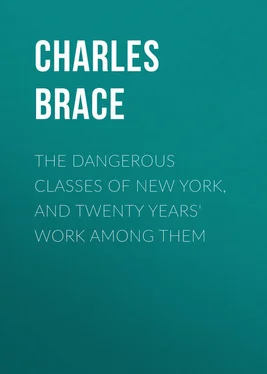Charles Brace - The Dangerous Classes of New York, and Twenty Years' Work Among Them
Здесь есть возможность читать онлайн «Charles Brace - The Dangerous Classes of New York, and Twenty Years' Work Among Them» — ознакомительный отрывок электронной книги совершенно бесплатно, а после прочтения отрывка купить полную версию. В некоторых случаях можно слушать аудио, скачать через торрент в формате fb2 и присутствует краткое содержание. Издательство: Иностранный паблик, Жанр: foreign_antique, foreign_prose, на английском языке. Описание произведения, (предисловие) а так же отзывы посетителей доступны на портале библиотеки ЛибКат.
- Название:The Dangerous Classes of New York, and Twenty Years' Work Among Them
- Автор:
- Издательство:Иностранный паблик
- Жанр:
- Год:неизвестен
- ISBN:нет данных
- Рейтинг книги:5 / 5. Голосов: 1
-
Избранное:Добавить в избранное
- Отзывы:
-
Ваша оценка:
- 100
- 1
- 2
- 3
- 4
- 5
The Dangerous Classes of New York, and Twenty Years' Work Among Them: краткое содержание, описание и аннотация
Предлагаем к чтению аннотацию, описание, краткое содержание или предисловие (зависит от того, что написал сам автор книги «The Dangerous Classes of New York, and Twenty Years' Work Among Them»). Если вы не нашли необходимую информацию о книге — напишите в комментариях, мы постараемся отыскать её.
The Dangerous Classes of New York, and Twenty Years' Work Among Them — читать онлайн ознакомительный отрывок
Ниже представлен текст книги, разбитый по страницам. Система сохранения места последней прочитанной страницы, позволяет с удобством читать онлайн бесплатно книгу «The Dangerous Classes of New York, and Twenty Years' Work Among Them», без необходимости каждый раз заново искать на чём Вы остановились. Поставьте закладку, и сможете в любой момент перейти на страницу, на которой закончили чтение.
Интервал:
Закладка:
In the Eastern Penitentiary of Pennsylvania, according to Dr. Bittinger, from one-fourth to one-third of the inmates are foreigners; in Auburn, from a third to a half; in Clinton, one-half; in Sing Sing, between one-half and six-sevenths. In the Albany Penitentiary, the aggregate number of prisoners during the last twenty years was 18,390, of whom 10,770 were foreign-born. [Transact. of Nat. Cong., p. 282.]
It is another marked instance of the demoralizing influence of emigration, that so large a proportion of the female criminal class should be Irish-born, though the Irish female laboring class are well known to be at home one of the most virtuous in the world.
A hopeful fact, however, begins to appear in regard to this matter; the worst effects of emigration in this country seem over. The machinery for protecting and forwarding the newly-arrived immigrants, so that they may escape the dangers and temptations of the city, has been much improved. Very few, comparatively, now remain in our sea-ports to swell the current of poverty and crime. The majority find their way at once to the country districts. The quality, too, of the immigration has improved. More well-to-do farmers and peasantry, with small savings, arrive than formerly, and the preponderance, as to nationality, is inclining to the Germans. It comparatively seldom happens now that paupers or persons absolutely without means, land in New York.
As one of the great causes of crime, Emigration will undoubtedly have a much feebler influence in the future in New York than it has had in the past.
It is remarkable how often, in questioning the youthful convicts in our prisons as to the causes of their downfall, they will reply that "if they had had a trade, they would not have been there." They disliked drudgery, they found places in offices and shops crowded; they would have enjoyed the companionship and the inventiveness of a trade, but they could not obtain one, and therefore they were led into stealing or gambling, as a quick mode of earning a living.
There is no doubt that a lad with a trade feels a peculiar independence of the world, and is much less likely to take up dishonest means of living than one depending on manual labor, or chance means of living.
There is nearly always a demand for his work; the lad feels himself a member of a craft and supported by the consciousness of this membership; the means of the "Unions" often sustain him when out of employment; his associates are more honest and respectable than those of boys depending on chance-labor, and so he is preserved from falling into crime.
Of course, if such a lad would walk forth to the nearest country village, he would find plenty of healthy and remunerative employment in the ground, as gardener or farmer. And to a country-lad, the farm offers a better chance than a trade. But many city boys and young men will not consent to leave the excitements of the city, so that the want of a mechanical occupation does expose them to many temptations.
The persons most responsible for this state of things are the members of such "Unions" as refuse to employ boys, or to encourage the training of apprentices. It is well-known that in many trades of New York, hardly any young laborers or apprentices are being trained. The result of this selfish policy will be to reduce the amount of skilled labor in this city, and thus compel the importation of foreign labor, and to increase juvenile crime and the burdens on the poor.
Another cause of this increasing separation from trades among the young is, no doubt, the increasing aversion of American children, whether poor or rich, to learn anything thoroughly; the boys of the street, like those of our merchants, preferring to make fortunes by lucky and sudden "turns," rather than by patient and steady industry.
Our hope in this matter is in the steady demand for juvenile labor in the country districts, and the substantial rewards which await industry there.
CHAPTER IV
It is extraordinary, among the lowest classes, in how large a number of cases a second marriage, or the breaking of marriage, is the immediate cause of crime or vagrancy among the children. When questioning a homeless boy or street-wandering girl as to the former home, it is extremely common to hear "I couldn't get on with my step-mother," or "My step-father treated me badly," or "My father left, and we just took care of ourselves." These apparently exceptional events are so common in these classes as to fairly constitute them an important cause of juvenile crime. When one remembers the number of happy second marriages within one's acquaintance, and how many children have never felt the difference between their step-mother and their own mother, and what love and patience and self-sacrifice are shown by parents to their step-children, we may be surprised at the contrast in another class of the community. But the virtues of the poor spring very much from their affections and instincts; they have comparatively little self-control, the high lessons of duty and consideration for others are seldom stamped on them, and Religion does not much influence their more delicate relations with those associated with them. They might shelter a strange orphan for years with the greatest kindness; but the bearing and forbearing with the faults of another person's child year after year, merely from motives of duty or affection to its parent, belong to a higher range of Christian virtues, to which they seldom attain. Their own want of self-control and their tendency to jealousy, and little understanding of true self-sacrifice, combine to weaken and embitter these relations with step-children. The children themselves have plenty of faults, and have doubtless been little governed, so that soon both parties jar and rub against one another; and as neither have instincts or affections to fall back upon, mere principle or sense of duty is not enough to restrain them. What would be simply slights or jars in more controlled persons, become collisions in this class.
Bitter quarrels spring up between step-son and mother, or step-daughter and father; the other parent sometimes sides with the child, sometimes with the father; but the result is similar. The house becomes a kind of pandemonium, and the girls rush desperately forth to the wild life of the streets, or the boys gradually prefer the roaming existence of the little city-Arab to such a quarrelsome home. Thus it happens that step-children among the poor are so often criminals or outcasts.
It needs a number of years among the lower working-classes to understand what a force public opinion is in all classes in keeping the marriage-bond sacred, and what sweeping misfortunes follow its violation. Many of the Irish peasants who have landed here have married from pure affection. Their marriage has been consecrated by the most solemn ceremonies of their church. They come of a people peculiarly faithful to the marriage-tie, and whose religion has especially guarded female purity and the fidelity of husband and wife. At home, in their native villages, they would have died sooner than break the bond or leave their wives. The social atmosphere about them and the influence of the priests make such an act almost impossible. And yet in this distant country, away from their neighbors and their religious instructors; they are continually making a practical test of "Free-Love" doctrines. As the wife grows old or ugly – as children increase and weigh the parents down – as the home becomes more noisy and less pleasant, – the man begins to forget the vows made at the altar, and the blooming girl he then took; and, perhaps meeting some prettier woman, or hearing of some chance for work at a distance, he slips quietly away, and the deserted wife, who seems to love him the more the more false he is, is left alone. For a time she has faith in him and seeks him far and near; but at length she abandons hope, and begins the heavy struggle of maintaining her little family herself. The boys gradually get beyond her control; they are kept in the street to earn something for their support; they become wild and vagrant, and soon end with being street-rovers, or petty thieves, or young criminals. The girls are trained in begging or peddling, and, meeting with bold company, they gradually learn the manners and morals of the streets, and after a while abandon the wretched home, and break what was left of the poor mother's hope and courage, by beginning a life of shame.
Читать дальшеИнтервал:
Закладка:
Похожие книги на «The Dangerous Classes of New York, and Twenty Years' Work Among Them»
Представляем Вашему вниманию похожие книги на «The Dangerous Classes of New York, and Twenty Years' Work Among Them» списком для выбора. Мы отобрали схожую по названию и смыслу литературу в надежде предоставить читателям больше вариантов отыскать новые, интересные, ещё непрочитанные произведения.
Обсуждение, отзывы о книге «The Dangerous Classes of New York, and Twenty Years' Work Among Them» и просто собственные мнения читателей. Оставьте ваши комментарии, напишите, что Вы думаете о произведении, его смысле или главных героях. Укажите что конкретно понравилось, а что нет, и почему Вы так считаете.












